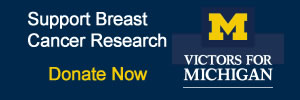Male Breast Cancer
Breast cancer in men is rare
Less than 1 out of 100 cases of breast cancer occurs in a man.1 It develops in the small amount of breast tissue found behind a man's nipple. Although the exact cause of breast cancer in men is not known, most experts agree that some men have a greater risk for breast cancer than others. Male breast cancer mostly affects older men.
Male Breast Cancer Risk Factors
Things that increase a man's risk of breast cancer include:
- Radiation exposure
- Family history of breast cancer in his female relatives
- Inheriting gene mutations, such as the BRCA2 gene
- Having a genetic disorder called Klinefelter syndrome or a liver disease (cirrhosis)
Male Breast Cancer Symptoms
The most common symptom of male breast cancer is a painless lump or swelling behind the nipple. Other symptoms can include a discharge from the nipple or a lump or thickening in the armpit. Although most men diagnosed with breast cancer are older than 65, breast cancer can appear in younger men. For this reason, any breast lump in an adult male is considered abnormal and should be checked out by a doctor. In addition, since there is no routine screening for breast cancer in men it is important to have lumps in the breast and/or thickening in the armpit checked.
Treatment for Male Breast Cancer
Male breast cancer is usually treated with surgery to remove the breast (mastectomy) and some lymph nodes. In some cases, breast-conserving therapy (lumpectomy + radiation) is possible.
Male breast cancer is similar to female breast cancer so many of the same treatments are used. These include radiation therapy, chemotherapy, anti-estrogen therapy, and targeted therapy.
Additional information about male breast cancer is provided by the National Cancer Institute: Male Breast Cancer Treatment (PDQ®).
Make an appointment/referral
If you or a loved one suspects male breast cancer, please call and speak to one of our Cancer AnswerLine™ nurses: 800-865-1125 (Monday-Friday, 8am-5pm EST). They are experienced in oncology care, including helping patients and their families who have questions about cancer. They can also assist you in getting the appointment process started, if you decide to have your care at the U-M Rogel Cancer Center.

